- Home
- MaryJanice Davidson
Deja Who Page 17
Deja Who Read online
Page 17
“You’re going,” he muttered, occasionally glancing at her in the mirror, “to keep talking at me about this. Aren’t you?”
“Yes, I am. Because it’s important, Detective.”
“How is not convincing me you didn’t kill the mother you admitted wishing dead important? How is anything else we could be discussing more important than you getting clear?”
“Sorry, I misspoke. It’s not important to me.”
“Aw, hell. Look, there’s nothing wrong with me.”
Excellent. He was ignoring Cop 101, to wit, don’t engage with the psycho in the backseat. She had worried he would blithely ignore her, or feign interest while toting up an imaginary scoreboard in the middle of his brain (Reasons I Can Justify Arresting That Pain in My Ass Leah Nazir).
“Nothing,” he said again, as if saying a word meant anything, or changed anything.
“Of course there is.”
He sighed. “The polite thing to do—”
“Don’t waste my time with Etiquette 101. You’re arresting people for homicide because they scared you and pissed you off—”
“You’re half right,” he retorted, managing to drive steadily out of pure force of will.
“—which will not be at all good for your career. And honestly, Detective, aren’t you tired of being afraid of not knowing? You’ve been worrying for years that you feel guilty because you were a killer of some kind. Well, you weren’t. Don’t you want to know who was? There’s a reason you’re a homicide detective instead of a cable repairman.”
“That’s not relevant to your mother’s murder.”
“Of course it isn’t.” He sighed, possibly in relief. “Except for the whole false arrest debacle.” He groaned, probably not in relief.
“I don’t want to discuss this.”
“But it’s a long dull drive.” She guessed. She had no idea which precinct/ideal body dump site he was taking her to. “And I do want to discuss it.”
“Change of subject.”
“But it’s so foolish, especially when you consider how close you are to putting the nightmares of your childhood behind you.”
“Change of subject right now.”
“You’re right. There is one more option.” You realize you’re antagonizing a grown man with a gun, yes? Have you considered the fact that he might be your killer? Leah ignored her inner voice, which often made cowardly suppositions. Here was a man who had a problem she could assist him with. If he was her killer, so be it. At least she wouldn’t wonder anymore.
Oh but Archer . . .
She shoved that thought away. “You could go the other way, I guess.”
“Miss Nazir, I do not fucking want to talk about this!”
Hearing a sworn officer of the law shriek in a closed vehicle as she sulked in the backseat with her hands cuffed behind her was a definite first. Oh, the colleagues she loathed would adore this. Perhaps she would embellish the story for them: “And then he perpetrated police brutality all over my head and shoulders which stung horribly.” Mmmm . . . better not. In addition to being illegal, false allegations of police brutality were impolite, and sometimes led to murderous misunderstandings.
“All right,” she said after a long moment in which a) she was intrigued and b) Detective Preston was grateful. “I only have one thing to add—stop that,” she scolded as Preston banged his head on the steering wheel. It was fortunate they were at a red light. And that the horn was located elsewhere in the vehicle. “You’ll kill us both, or give yourself a nasty headache, or both, or you’ll only kill you, or you’ll only kill me. All those results are unacceptable.”
“I. Am. Begging. You.”
“My last comment on the subject under discussion—”
“It’s not! Under discussion, I mean.”
“—is that none of it was your fault. I implied as much because I’m a bitch, for which I have apologized.”
“You didn’t, actually. Oh my Christ, we’re still talking about this.”
“Hmm.” That brought Leah up short. “Well, I meant to apologize. It was on my list of things I meant to discuss. But as I was saying, none of it was your fault; it was all on Albert DeSalvo.”
True to her word, she dropped the subject and contented herself with looking out the window and humming “No Light, No Light” under her breath. Florence and the Machine was one of the more vastly underrated musical acts in the history of music. She wondered if Detective Preston took requests.
At the station she had been booked, which was a series of paperwork, followed by her mug shot, and then her fingerprints were taken (no ink required in the twenty-first century and she was a bit let down, having been looking forward to the drama of ink-stained fingertips), scanned, and put into the System, which, as an Insighter, was redundant, as upon licensing all Insighters were routinely printed and photographed, new photos required every five years.
Then she had been escorted to a spotless, well-lit holding cell
(does television get everything wrong?)
populated by half a dozen other women of various ages, conventional attractiveness, skin color, and clothing choices. Per television, they should all be prostitutes and/or meth addicts.
Only one of them looked like a prostitute (Leah did not approve of tube tops on anyone, never mind an overweight, sallow-skinned woman in her late thirties) and she was the shoplifter. The others were:
1) Karen the Boyfriend Beater. Karen was a gorgeous young lady (“Young lady? Jeez. I’m twenty-nine, okay, and when I was fourteen, I helped my uncle set the Piggly Wiggly on fire, so ‘lady’ is off, too.”) with skin so dark it had mahogany undertones. She tolerated her boyfriend’s gambling habit, his inability to keep a steady job (which was hilarious, as he was a temp worker, so his steady job was to not keep a steady job), and his unfortunate propensity for anal sex. (“That doesn’t sound so bad,” Renee the Shoplifter said. “Only anal sex.” “Oh.”)
Karen worked both her jobs with an often-throbbing backside, but when she objected to his $1,000 wager on the outcome of an upcoming Cubs game, he backhanded her. Karen’s response to this was to hoist a knee into his testicles and, while he writhed and sniveled on the kitchen tile, beat him repeatedly in the face with a container of Clorox wipes. In true douchebag fashion, he called the police.
“That makes so much sense,” Leah decided after hearing the lurid and hilarious tale.
“Thanks!” Karen smiled, pleased. “My mom, she said the same thing, and all my sisters did, too.”
“Yes, well. You, and they, used to be comfort girls in Japan. Chinese comfort girls in Japan,” she emphasized, assuming they would catch the reference. “Sometimes comfort girls volunteered. You didn’t. So in this life, you’re not interested in tolerating male bullshit.”
“That’s creepy,” Karen announced, “but you’re pretty good. Normally I’d be super pissy about being called a hooker. No offense,” she told Celia the Hooker.
“No, no.” Celia waved it away. “S’fine.”
2) Terry the Sociopathic Cat Cooker. Terry did not like being on the wrong end of unrequited love. Not that what she felt for her boyfriend was love, unrequited or otherwise. “He’s the only one that can make me come,” she explained.
“Who can make you come.”
“He can. Like I said.”
“No, you said ‘he’s the only one that can make me come’ and it’s ‘who can make me come.’” At Terry’s long, unsettling stare (unsettling to someone unused to staring down socios once or twice a month), she added, “Never mind. Continue.”
“Right. Anyways—”
Good God. Anyway! Singular! If she says “towards” or “amongst” they’ll have to arrest me for homicide. Again.
“—he can’t make me feel that good all the time and then just take it away. He’s too big for me to hurt directly, so Muffin had t
o go.”
“He can, though,” Celia said. Leah concurred, but did not waste time or breath agreeing. “Just like you’ve got the right to dump anybody you want.”
“Yeah, that’s a totally different thing.”
“It’s not,” Celia tried again, to the same effect.
“And then that crybaby hostess calls the cops! Like Muffin muffins would be so much worse than the usual crap coming out of that kitchen.” Terry had indulged her anti-cat politics at her (former, Leah assumed) place of employment, Dan’s Diner. “Cat’s totally fine. Okay, a little singed. But otherwise fine. It’s not like I would have really done it.”
“Why lie to us, Terry?” Celia wondered. Oh, she was adorable. Leah assumed it was either a) the sociopath’s instinctive, perpetual habit of lying even when it was easier to tell the truth, or b) television’s portrayal of what happened to those in jail who became, as John Cusack put it, “garrulous in the company of thieves.” Hmm. Is that why she was so taken with Archer? He did remind her of Cusack in Better Off Dead, a bit, but not, thank heavens, Cusack in The Raven.
“So, what is it? Who’d I used to be?”
Leah shrugged. “You were a sociopath then, and you’re a sociopath now.” Déjà vu. She’d said that earlier to Chart #6116.
“Yeah, I figured.” Terry preened a bit, ignoring everyone’s tandem eye rolls.
How I loathe that sociopathy now has cultural cache.
3) Brienne the Shoplifter. Brienne alternately claimed entrapment, absentmindedness, and drunken intent. “It can happen to anybody!” she protested. “I was thinking about the rest of my errands and took it without thinking.”
“Brienne.”
“You can’t tell me people don’t do that every damn week in this country.”
“Brienne.”
“It was one thing.”
“It was a ten-speed bicycle from Wal-Mart.”
She threw up her hands. “Without thinking! Can happen to anyone!”
“For God’s sake.”
She dropped her hands back to her lap, a petite blonde who could not pull off a tube top. “So what’s the scoop? What’s my backstory?”
“I have no idea.” At the other woman’s glare, Leah added, “Sorry. Don’t believe what you see on TV; Insighting doesn’t explain everything. Sometimes people do silly things.” And that, too, sparked déjà vu; it reminded her of Archer. Although these last several days, few things did not remind her. How irritating, while also comforting. “If you were my patient, I’d have to put you on reindyne and we’d likely have to do a few sessions. And even then I might not be able to help you.” And regardless, you would be responsible for your actions in this life, whoever you were in another life.
4) Charlie the Scofflaw. Charlie, the oldest in their group, in her early fifties, was a beautifully dressed woman with skin like hot chocolate with lots of milk, a fifty-dollar manicure, a hundred-dollar haircut, and thirty-eight unpaid tickets. She was waiting to be bailed out by her assistant, or for the mayor to hear of her predicament and do some arm-twisting. At Leah’s curious glance, she shook her head.
“Sorry, did you want me to do something?”
“That’s okay.” Charlie tried a smile, but wouldn’t meet Leah’s gaze. “I’d rather you didn’t.”
“That works well, since I can’t see you.”
She shrugged and examined her long, elegant nails. “No, I wouldn’t expect you could.”
“At all.”
“Don’t worry.” This time the smile was a bit more real. “It’s not contagious.”
“Actually it’s interesting. Maybe only to me,” she added, “but you’re the second life-blinder I’ve met this month. My boyfr—my stabbing vic— My future lover . . . well, hopefully; he is proving a tough nut to crack, no pun intended. Stop laughing at me, Celia, and yes, I’m aware there are multiple layers to that comment. You don’t—”
“You said the cops think you killed your mom! And you stabbed someone?”
“The one has nothing to do with the other, and it’s rude to interrupt. Anyway, I can’t see him, either. I thought it would be creepy and unsettling, but it’s . . .” She had to think about it, something she had not allowed herself to do as of yet. She had outstanding excuses to put off examining her feelings, her mother’s murder holding pride of place on the list, but she also understood they were only that: excuses.
“It’s nice,” she finally decided. “He doesn’t expect anything from me. No offense,” she added as she saw a few of the women frown, “because you didn’t, either. I more or less forced myself on you.”
“Yeah,” Terry said. “We’re the victims.”
“No one who had to be forcibly prevented from microwaving their boyfriend’s cat unto death gets to claim that status.”
“You don’t know what it’s like to be me.”
“I know exactly what it’s like to be you,” Leah replied, bored. She turned back to Charlie. “May I ask a personal question?” Without waiting for an answer, she continued. “You seem like your life is in order, judging superficially by your clothing and accessories and lovely manicure and diction. You’re successful on your own? It’s not from marrying well?”
“I run a consulting firm.” Charlie’s voice was as stunning as she was, rich and dark like pricey chocolate. It wasn’t unlike verbal velvet.
That gave her pause. “Consulting firm” could be anything from a food truck empire to the mafia, but Leah had no interest in quibbling. “And you never thought that your inability to see what happened in your life before, that never held you back. Right?”
“Of course not. What matters is . . .” She trailed off.
“What you do in this life.” That sounded like a sufficient cliché. But the thing about clichés is, as Nellie had pointed out, they are truth. “It works both ways, doesn’t it? A lack of previous life knowledge can be considered crippling by some—” My entire profession, for example. Me, earlier this month. “—but as freedom for others. There’s not one thing to hold you back, yes?”
“Just me,” Charlie replied, and they shared a smile like it was a sweet secret. “And I don’t think I’m blind. I think I’m rasa.”
That made Leah’s smile drop off. “Oh, I don’t—ah—interesting.”
The woman gave her a level, unblinking look. “You don’t believe it.”
“I’m not your Insighter,” she hedged like a craven, cringing coward.
“And you’re too polite to tell me I’m full of shit.” She glanced around the cell, a pointed but silent reminder that Leah was outnumbered. “Or too cautious.”
“Is there a way to answer you without upsetting you?”
She smiled. “It does happen, you know. You, especially, would know.”
Not really. Not for decades upon decades. As with religious miracles, the further past the Age of Enlightenment society crawled, the less often miracles were acknowledged. The chances of a random rasa being really, truly tabula rasa were the same as the image of the Virgin Mary in a basement water stain being an actual sign from God. It wasn’t a miracle, it was simulacra.
“It doesn’t matter,” Charlie finished. “I know what I know.”
“Then let’s leave it at that.”
“Let’s.”
5) Celia the Hooker. Leah had met more than one in her professional capacity, but not one so thoroughly undamaged, unashamed, and indifferent to Leah’s services. “Don’t worry about it,” she said after the other girls had begged Leah to, as Terry put it, “Insight the shit out of us!” “I’m fine on my end.”
“But don’t you want to—”
“Tom Mulligan.”
Leah blinked. “Who is Tom Mulligan? Besides you, of course.”
“A regular guy. Nice childhood, nice college, got a nice job, married a nice girl, had nice kids.” Celia smiled a little. “Di
ed a nice death at home, at age seventy-two, holding his wife’s hand. Cancer. He blew off chemo the third time; he felt the radiation was making him feel much worse than no radiation.”
“Imagine that.”
The other woman’s smile widened. “Yeah, crazy talk, right? That radiation can hasten your death? Anyway. I’m not in the second-oldest profession—I’m pretty sure agriculture was the first—because I was raped by an older brother or because I used to be Anne Boleyn. These were my choices.” She shrugged. “It’s boring.”
“You’re not boring.” Though it sounds as though Tom Mulligan was. Leah respected Celia’s wishes and did not express aloud the sentiment that Celia’s choices brought her to a Chicago jail cell in the middle of the day, something Tom Mulligan never experienced. “But it’s nice to have someone prove what I always say. That we didn’t all used to be famous people. Sometimes we were just John Smith. Or Tom Mulligan.”
“None of this is helping me with my problem,” the sociopath interrupted, and Leah had to laugh, because the thing was, Terry truly felt that sense of being wronged. Her sociopathy provided gargantuan levels of entitlement. It was never, ever her fault, she deserved everything she desired, and she believed that catechism the way the pope believed in tithing. Leah knew people felt sorry for people like Terry (“Oh but their lives are so empty since they can only love themselves and they’re forever chasing highs and never holding on to them so they’re always unfulfilled poor deluded creatures”) but Leah never bothered. People so ruthlessly set on forwarding their own self-interest needed no one’s pity.
So jail had been interesting. Just when they decided to play “weirdest place you’ve ever done it” (Celia was disqualified, and asked to be the judge), along came Detective Preston, wearing an unmistakable “just got chewed out by my boss” expression. He had let her out, then took the time to walk her out. If he could be gracious in defeat, Leah could be gracious in entitled bitchiness, and gave him a proper apology. He seemed to appreciate it, and she was gratified to see he seemed to be paying attention to her words. Time, of course, would tell.

 The Royal Treatment
The Royal Treatment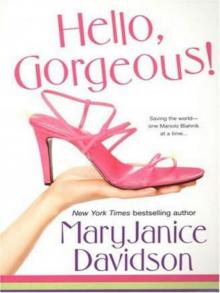 Hello, Gorgeous!
Hello, Gorgeous!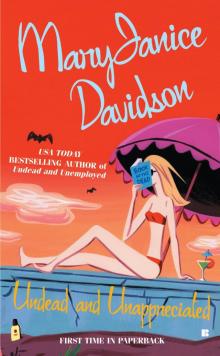 Undead and Unwed
Undead and Unwed Fish Out of Water
Fish Out of Water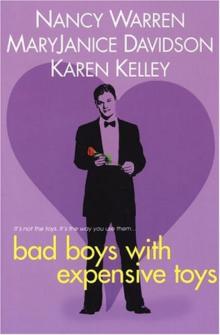 The World Is Too Darned Big
The World Is Too Darned Big Loves Prisoner
Loves Prisoner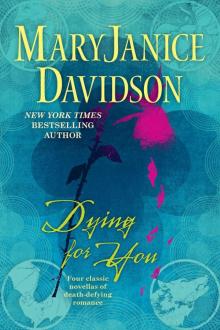 Dying for You
Dying for You Love Lies
Love Lies Really Unusual Bad Boys
Really Unusual Bad Boys The Royal Mess
The Royal Mess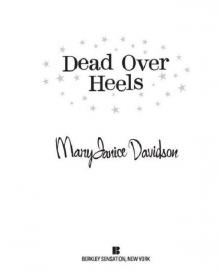 Dead Over Heels
Dead Over Heels Rise of the Poison Moon
Rise of the Poison Moon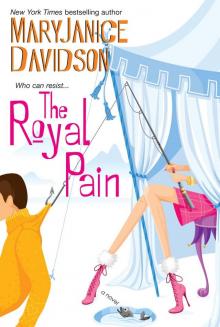 The Royal Pain
The Royal Pain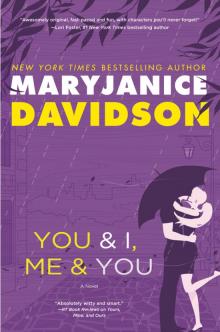 You and I, Me and You
You and I, Me and You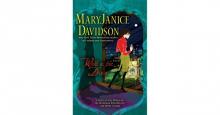 Jareds Wolf
Jareds Wolf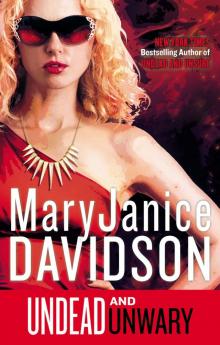 Undead and Unwary
Undead and Unwary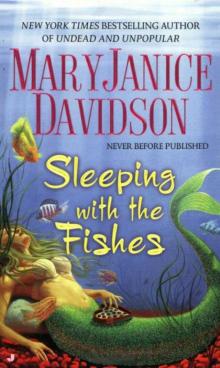 Sleeping With the Fishes
Sleeping With the Fishes Danger, Sweetheart
Danger, Sweetheart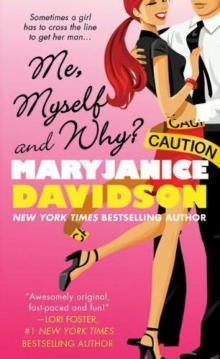 Me, Myself and Why?
Me, Myself and Why?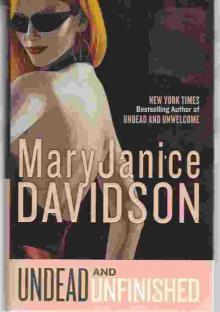 Undead and Unfinished
Undead and Unfinished Deriks Bane
Deriks Bane Thief of Hearts
Thief of Hearts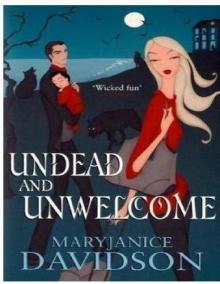 Undead and Unwelcome
Undead and Unwelcome Deja Who
Deja Who Deja New
Deja New Under Cover
Under Cover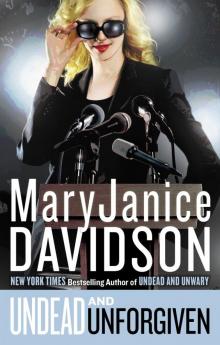 Undead and Unforgiven
Undead and Unforgiven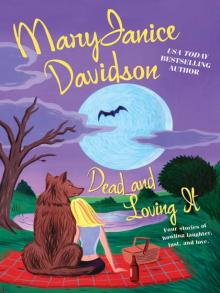 Dead and Loving It
Dead and Loving It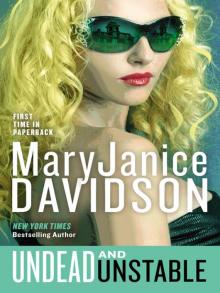 Undead and Unstable
Undead and Unstable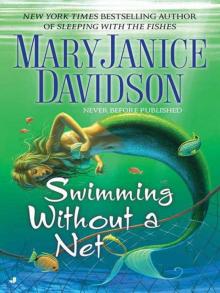 Swimming Without a Net
Swimming Without a Net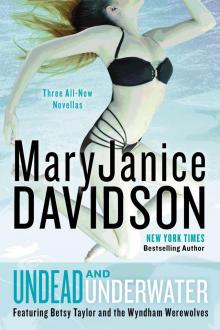 Undead and Underwater
Undead and Underwater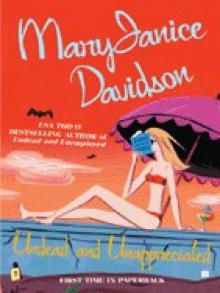 Undead and Unappreciated
Undead and Unappreciated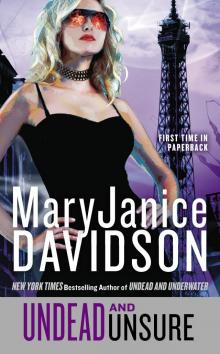 Undead and Unsure
Undead and Unsure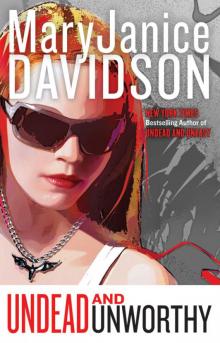 Undead and Unworthy
Undead and Unworthy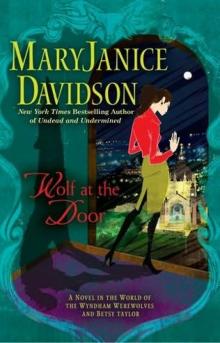 Wolf at the Door
Wolf at the Door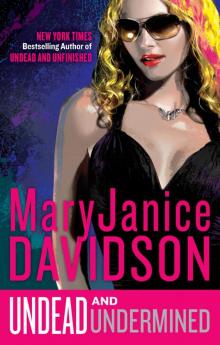 Undead and Undermined
Undead and Undermined Undead and Unpopular
Undead and Unpopular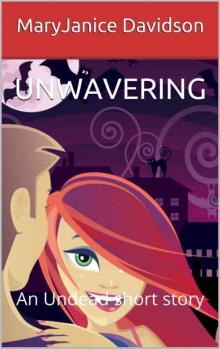 Unwavering
Unwavering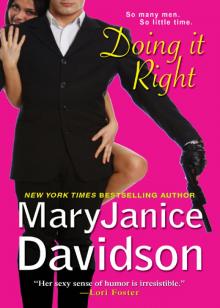 Doing It Right
Doing It Right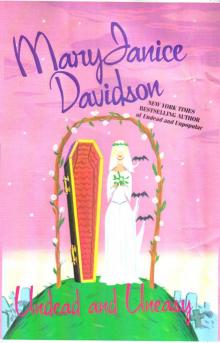 Undead and Uneasy
Undead and Uneasy Drop Dead, Gorgeous!
Drop Dead, Gorgeous!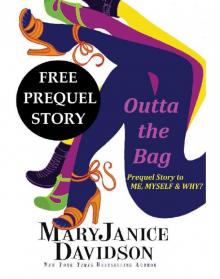 Outta the Bag
Outta the Bag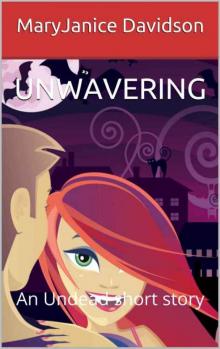 UNWAVERING: An Undead short story (Undead shorts Book 1)
UNWAVERING: An Undead short story (Undead shorts Book 1) Jennifer Scales and the Ancient Furnace
Jennifer Scales and the Ancient Furnace Yours, Mine, and Ours
Yours, Mine, and Ours Under Cover (v1.1)
Under Cover (v1.1) Jennifer Scales and the Messenger of Light
Jennifer Scales and the Messenger of Light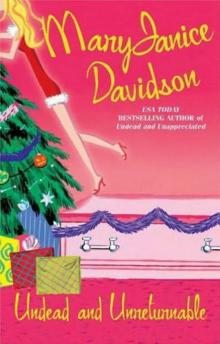 Betsy 4 - Undead and Unreturnable
Betsy 4 - Undead and Unreturnable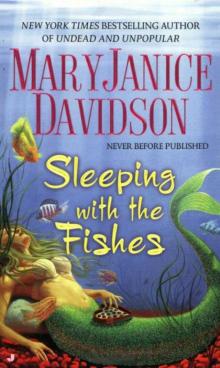 Sleeping with the Fishes (v1.1)
Sleeping with the Fishes (v1.1) betsy short 02 - ureliable
betsy short 02 - ureliable Evangelina
Evangelina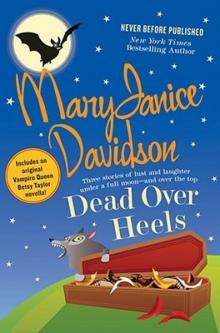 Dead Over Heels (wyndham werewolf)
Dead Over Heels (wyndham werewolf)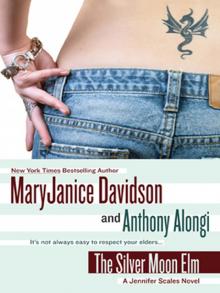 The Silver Moon Elm
The Silver Moon Elm Faeries Gone Wild
Faeries Gone Wild Surf's Up
Surf's Up Seraph of Sorrow
Seraph of Sorrow Demon's Delight
Demon's Delight